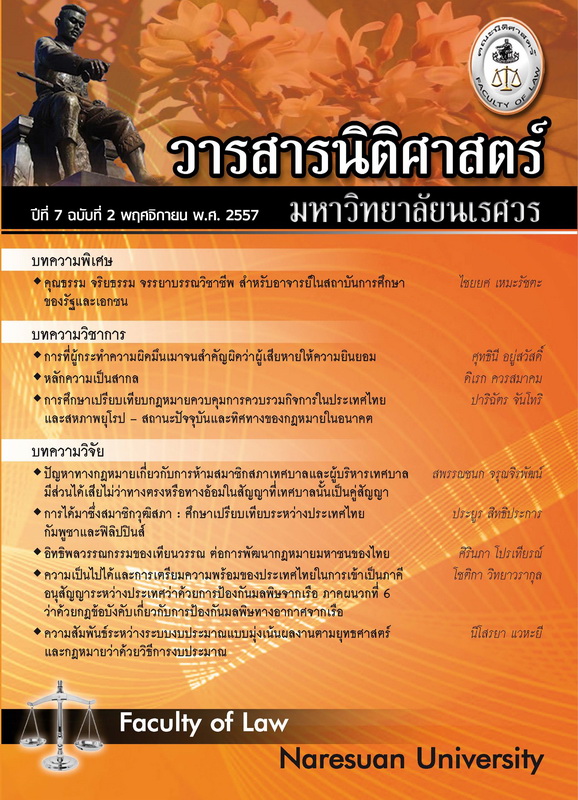The offender intoxicated himself and mistook that the injured person give him the consent
Main Article Content
Abstract
According to social, economic and political conditions are in the current stress. So the people must find the way to remedy their stress whether by playing sport, exercising, traveling, doing outdoor activities or praying etc. These activities are all beneficial to the bodies and minds of those individuals. But some people find their solution by drinking alcohol, intoxicant abuse or drug abuse, which can affect the bodies and minds of those who take them. Furthermore, it may also cause criminal’s problem because some people have committed crime while intoxicated.
The offence, while the offender is intoxicated, has been defined in Penal Code section 66, which is excuse. It provided that the intoxication is caused without the knowledge or against the will of the offender, and such person has committed the offence at the time of not being able to appreciate the nature of illegality of his act or not being able to control himself. If alcohol or the otherwise intoxicated offender commit the offence by mistake of fact that the victim give him the consent, the legislation’s result would be like. This article presents the idea of the criminal law and the facts relate to the offender committed crime while intoxicated, and mistake of fact that the victim give him consent. Furthermore, this article will be a source of information in study and will be a source of searching in the future.
Article Details
References
เกียรติขจร วัจนะสวัสดิ์และทวีเกียรติ มีนะกนิษฐ. รวมหมายเหตุท้ายคำพิพากษาศาลฎีกา: กฎหมายอาญาของศาสตราจารย์จิตติ ติงศภัทิย์. พิมพ์ครั้งที่ 4 แก้ไขเพิ่มเติม. กรุงเทพฯ: มหาวิทยาลัยธรรมศาสตร์, 2540.
โกเมศ ขวัญเมือง. กฎหมายอาญาชั้นสูง. กรุงเทพฯ: วิญญูชน, 2550.
คณิต ณ นคร. กฎหมายอาญาภาคทั่วไป. พิมพ์ครั้งที่ 4 แก้ไขเพิ่มเติม. กรุงเทพฯ: วิญญูชน, 2554.
จิตติ ติงศภัทิย์. คำอธิบายประมวลกฎหมายอาญา ภาค 1. พิมพ์ครั้งที่ 10 แก้ไขเพิ่มเติม. กรุงเทพฯ: ห้างหุ้นส่วนจำกัดจิรรัชการพิมพ์, 2546.
ณรงค์ ใจหาญ. “แนวคิดในปัญหาความสำคัญผิดในเหตุที่ผู้กระทำมีอำนาจกระทำได้.” วารสารนิติศาสตร์. 15, no.4 (2528): 82.
ณรงค์ ใจหาญ. “ความสำคัญผิดในเหตุที่ผู้กระทำมีอำนาจกระทำได้.” วิทยานิพนธ์มหาบัณฑิต คณะนิติศาสตร์ มหาวิทยาลัยธรรมศาสตร์, 2526.
ทวีเกียรติ มีนะกนิษฐ. คำอธิบายกฎหมายอาญา ภาคทั่วไป. พิมพ์ครั้งที่ 13 แก้ไขเพิ่มเติม. กรุงเทพฯ: วิญญูชน, 2556.
วรรณา พัฒนาศิริ. “กระบวนการยุติธรรมกับการแก้ไขปัญหาเมาแล้วขับ.” สถาบันพัฒนาข้าราชการฝ่ายตุลาการศาลยุติธรรม สำนักงานยุติธรรม หลักสูตร “ผู้พิพากษาผู้บริหารในศาลชั้นต้น” รุ่นที่ 10, 2555.
สหรัฐ กิติ ศุภการ. หลักและคำพิพากษากฎหมายอาญา. พิมพ์ครั้งที่ 2 แก้ไขเพิ่มเติม. กรุงเทพฯ: อมรินทร์พริ้นติ้งแอนด์พับลิชชิ่ง, 2557.
แสวง บุญเฉลิมวิภาส. หลักกฎหมายอาญา. พิมพ์ครั้งที่ ๔ แก้ไขเพิ่มเติม. กรุงเทพฯ: วิญญูชน, 2546.
แสวง บุญเฉลิมวิภาส. “โครงสร้างความผิดอาญา: ความแตกต่างในระบบกฎหมาย”. วารสารนิติศาสตร์. 4, no.14 (2527): 8-13, 45-46.
James W.H. McCord and Sandra L. McCord. Criminal Law and Procedure for the Paralegal: A system Approach. 3rd. United State: The Thomson Delmar Learning, 2006.
Smith and John Cyril. Criminal Law. 6th. London, Edinburgh: Butterworths, 1998.
Wayne R. LaFave. Hornbook Series on Criminal Law. 4th. West: A Thomson Business,
2003.


